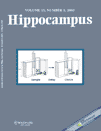Inhibition of hippocampal protein synthesis following recall disrupts expression of episodic-like memory in trace conditioning
Abstract
Transition of short-term to long-term memory is referred to as consolidation and the process is dependent on protein synthesis. Recently, several studies have shown that expression of consolidated memory for simple forms of learning tasks (e.g., delay conditioning, contextual fear, inhibitory avoidance) becomes vulnerable to disruption by inhibition of protein synthesis when administered shortly after recall. In the present study, we address whether recall-induced dependence on protein synthesis is a fundamental property that can be applied to a form of memory requiring attentional awareness or is specific to memories for simple forms of conditioning. Trace fear conditioning is a form of learning that requires an active memory trace to associate a conditioned stimulus (CS) with an unconditioned stimulus (US) separated by time. Our data demonstrate that whether a CS-alone recall trial in a novel context acts as an extinction or reactivation trial depends on the strength of the original memory. Inhibition of protein synthesis following the recall trial in animals receiving one trace conditioning training session (that gives rise to weak memory) resulted in enhanced CS-elicited freezing compared with vehicle control, as a result of impaired extinction memory, but had no effect on contextual memory. However, inhibition of hippocampal protein synthesis following the recall trial in animals receiving two trace conditioning training sessions (that gives rise to stronger memory) resulted in impaired retention of both trace CS-US associative and contextual memory despite that the context-US association was not directly reactivated. This provides evidence that, for a robust memory, the CS-alone recall trial results in the reactivation of an episodic-like memory, including trace CS- and contextual-memory, and that hippocampal information storage for the memory as a whole is returned to a labile state requiring de novo protein synthesis. This and other studies are consistent with the role of the hippocampus in coordinating episodic memory retrieval. © 2004 Wiley-Liss, Inc.




